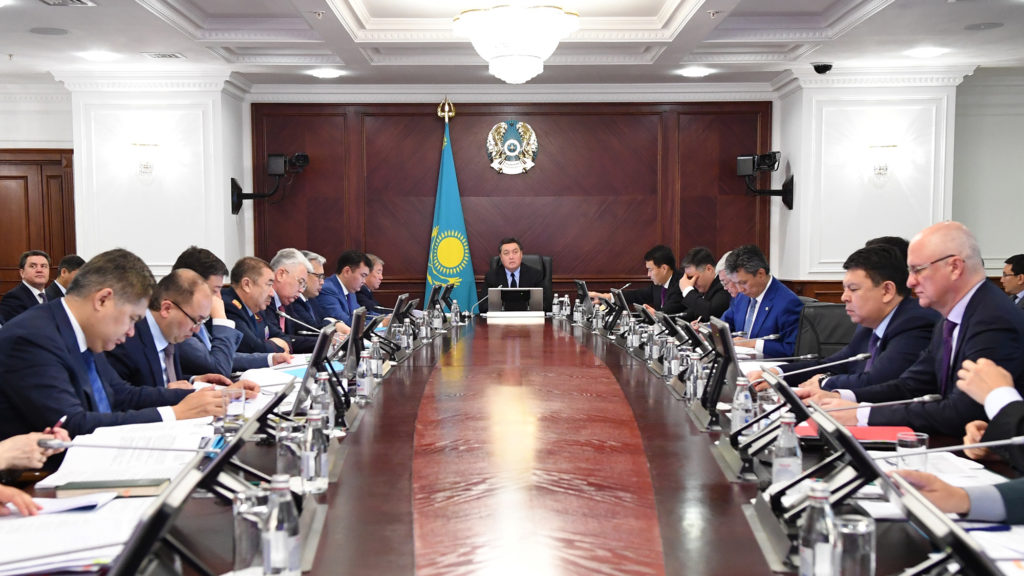NUR-SULTAN – The Kazakh government recently adopted an action plan to implement the election platform of recently elected President Kassym-Jomart Tokayev. The platform focuses on continuing to have existing policies, ensuring justice and progress.
Tokayev stressed during his campaign that if elected he would continue the political course of the country’s founding President Nursultan Nazarbayev.
“The measures in the action plan fully reflect the political course of Strategy 2050, five institutional reforms and Kazakhstan’s third modernisation,” said Kazakh First Deputy Prime Minister and Minister of Finance Alikhan Smailov at a June 25 government session.
The justice principle envisions promoting the rule of law and fair judiciary, increasing public safety, curbing corruption at all levels and creating a social security system targeting low income and large families.
Among the initiatives is the introduction of a social card or social ID to increase the transparency of targeted social assistance. The card will show the information about the income and standard of living of each citizen and all social obligations of the state, including allowances to socially vulnerable categories.
“Defined contributions pension scheme will be improved by building long-term actuarial models,” said Smailov.
The justice part of the plan includes improving Kazakhstan’s healthcare system. The government seeks to address a shortage of specialists, expand access to medical aid, bring mobile doctors to remote areas and digitise the system.
The doctor to patient load is expected to drop to 1,700 people, bringing Kazakhstan closer to the Organisation for Economic Cooperation and Development (OECD) recommended maximum of 1,500 people. Healthcare spending is also expected to reach five percent of the country’s GDP by 2025.
“In the next three years, primary health care facilities will be equipped with 11,000 units of medical equipment. Five-hundred and ninety-five primary health care facilities will be opened and 228 facilities will go through a major renovation,” said Smailov.
Improving the quality of pre-school education, transitioning to an updated school curriculum, transitioning to 12-year secondary education and incorporating the use of three languages are among the education goals.
The Enbek national programme, part of the action plan, is designed to create jobs, encourage employers to create conditions for their workers to acquire new skills and knowledge and develop social entrepreneurship.
Smailov said the government expects to create nearly 370,000 jobs and help as many as 500,000 people find jobs annually.
“The plan is also to prepare a comprehensive employment monitoring system and create a single database of the created jobs,” said Smailov.
“Special attention will be paid to increasing responsibility and accountability of state workers for implementation of state programmes and use of budget funds. A set of measures will be developed to improve budget planning and reduce inefficient image building spending,” said the minister.
The country’s national programmes will be analysed to evaluate their efficiency in supporting business, another important area in the document.
“The measures will be taken to develop and support business, particularly stimulating entrepreneurial initiative and enhancing business climate. The results of the analysis will be used to develop new approaches incorporating cross liabilities of entrepreneurs,” said Smailov.
The Business Roadmap 2025 programme will develop new tools of financial and other support for entrepreneurs in an effort to increase the share of small and medium-sized businesses in the economy to 35 percent by 2025 and 50 percent by 2050. The programme will also increase loan amounts and engage microfinance organisations.
“We will analyse the situation at key commodity markets and will develop a road map to eliminate barriers for competition and prevent abuse of monopoly power. We will need to work on the adoption of a revised law on rehabilitation and bankruptcy using the best practices in the OECD countries,” said Smailov.
To strengthen the financial system, the government plans to restrict transfers from the National Fund, decrease the dependency on the resource sector and develop a set of measures to communicate the implementation of the exchange rate policy of the National Bank, among other goals.
“We will continue working to develop the stock market and carry out IPO of national companies. The measures will allow increasing the efficiency of state management, create favourable conditions to run competitive business and improve the welfare of the people,” said Smailov.
Implementation of these measures should be a first priority for the government, said Kazakh Prime Minister Askar Mamin.
“We need to take a proactive position in addressing problems, particularly social ones. All social obligations of the state must be fully fulfilled,” said Mamin.

